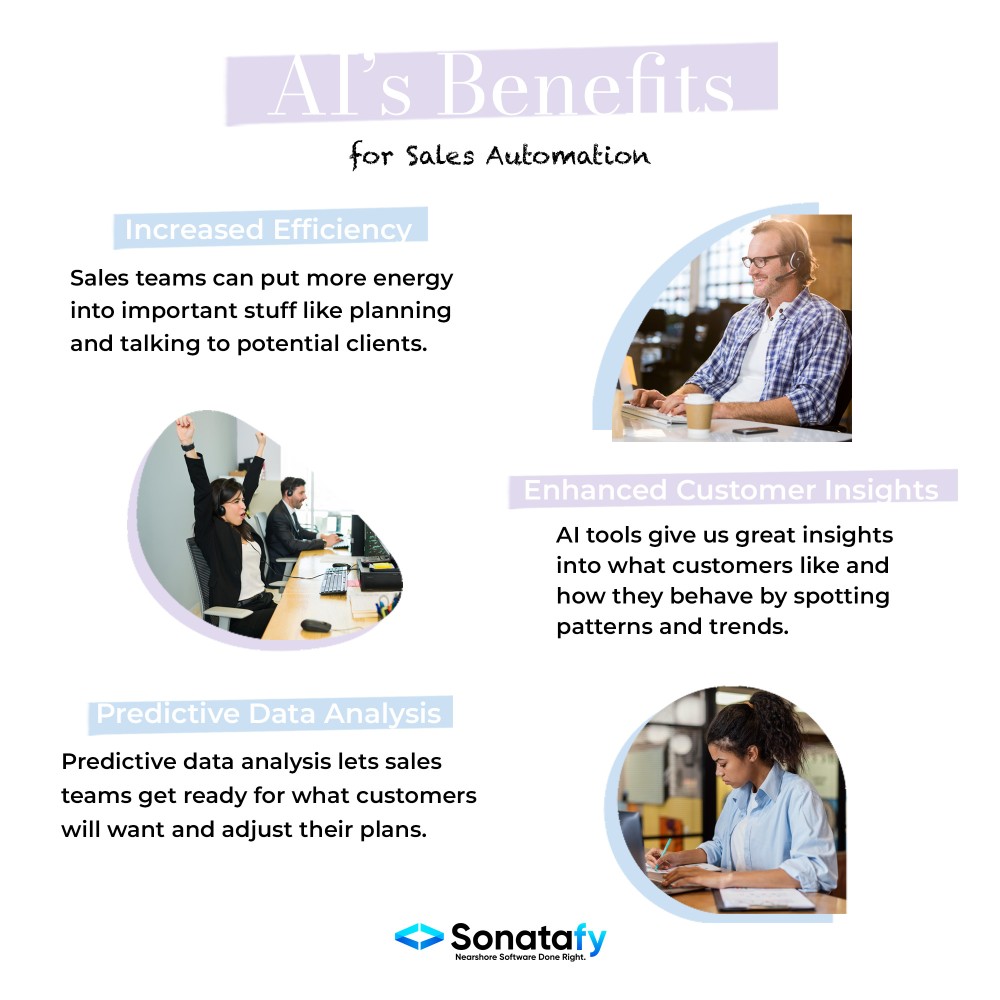It’s truly incredible to witness the transformative impact of artificial intelligence (AI) on modern businesses. Introducing AI into sales processes allows for streamlined operations, heightened efficiency, and accelerated progress. I firmly believe that integrating AI into sales strategies will significantly enhance overall performance and success.
AI in Sales Automation
To really benefit from using AI for sales automation, first, you need to understand what it’s all about. AI for sales automation uses the latest technologies, such as machine learning, natural language processing, and data analytics, to create highly usable solutions that sales teams manage. These systems can filter through vast amounts of data, predict buyer behavior, and perform repetitive tasks, allowing salespeople to focus on their strengths: establishing and delivering deals completely.

Increased Efficiency
I think one of the most useful aspects of using AI in sales is the amount of time it saves. Sales teams can save significant time by sending tasks like data entry, priority scoring, and follow-up emails. This means they can put more energy into important stuff like planning and talking to potential clients. Personally, I think it not only increases team productivity but also makes everyone happy because they can focus on what they do best.
Enhanced Customer Insights
AI tools are pretty amazing. They can analyze customer data super quickly and on a big scale, way faster than we humans can. These tools give us great insights into what customers like and how they behave by spotting patterns and trends. Personally, I think it’s essential to have this information in order to optimize our sales strategies and keep the customers happy. I believe that the more flexible we are in our process, the more likely we are to close a case.
Predictive Data Analysis
Predictive data analysis is a big deal thanks to AI in sales automation. With AI tools looking at past data, they can predict what’s coming and how customers will act. This lets sales teams get ready for what customers will want and adjust their plans. I think this smart approach makes success more likely because it helps sales teams stay ahead of the game.
Implementing AI in Sales Automation
Identifying the Right Tools
It’s essential to choose the right AI tools to make it work. You should evaluate equipment based on its capabilities, ease of installation, and adaptability to company needs. The tools should fit your sales processes and be flexible enough to help your business expand.
Training and Support
Implementing AI tools is an ongoing process, not a one-time event. I think we must continue to train and support salespeople so they can get the most out of this technology. Having regular training sessions and access to support resources will help the teams stay updated with all the cool features and best practices.
Data Quality and Management
AI tools work best with high-quality data. It’s crucial to have strong data management practices to ensure the data is accurate, complete, and current. This means regularly cleaning and checking the data to keep it reliable.
Overcoming Challenges in AI Sales Automation
Resistance to Change
One of the biggest challenges of implementing AI into sales automation is that some people can be resistant to the idea. They worry that AI will take their jobs, so it is critical to demonstrate how AI can really improve their jobs rather than replace them. We can reduce their concerns and gain their support by emphasizing the benefits, such as reduced paperwork and more informed decision-making.
Integration with Existing Systems
Remember, integrating AI tools with current sales systems can be pretty tricky. I think it’s essential to plan carefully and work closely with the IT teams to make sure everything comes together smoothly. This may require some deliberate upgrades, data migration, and extensive testing to ensure new tools and existing systems work correctly.
Constant Improvement
AI techniques and technologies are constantly evolving. To compete, organizations must regularly update their AI technology to take advantage of the latest developments. This includes a willingness to acquire new skills and invest in the latest technology.
AI’s Future in Sales Automation
I am very positive about the potential of AI in sales automation. With AI technology growing, I believe we’ll see more advanced tools offering deeper insights and better automation. By combining AI with emerging technologies like IoT and blockchain, we can transform the retail landscape.
Using AI for a Competitive Boost
Embracing AI in sales automation is more than just staying current. It’s also about staying ahead of the competition. Organizations that use AI solutions to accelerate sales have a competitive advantage in responding to change, understanding customers, and delivering improvements.
Practical Steps to Get Started with AI in Sales
Assess Your Needs
When deciding to use AI in sales automation, the first step is to figure out what you need. It’s crucial to analyze how you currently sell and see where AI can help. That could be things like finding new potential customers, managing relationships with existing customers, or predicting sales.
Start Small
When using AI for sales automation, I believe it’s best to start small. If you want to see how AI tools affect your marketing, you can begin with a test project. This way, you can make changes and improve your strategy before implementing AI tools across your entire sales operation.
Measure and Optimize
Once you develop AI tools, you need to evaluate their performance and improve them. Targeting sales, customer engagement, and performance will help identify areas for improvement and ensure you get the most out of your AI investment.
The Human Element in AI Sales Automation
While AI offers many benefits, it’s important to remember that human interaction is still important in sales. AI can provide useful insights and automate time-consuming processes, but it can’t replace the personal relationships vendors provide. I think the best approach is to use AI as a complement instead of replacing human skills. Companies benefit greatly by combining the power of AI with the experience of sales professionals.
Conclusion
I believe artificial intelligence solutions to automate sales processes will revolutionize the software development field. AI solutions can dramatically improve sales operations by increasing productivity, providing deeper insights into customer behavior, and allowing for predictive analytics. However, successful implementation means careful planning, ongoing training, and solid data management practices. Making the most of AI in sales execution is critical to overcoming challenges, including resistance to change and integration issues. Looking ahead, I believe organizations that embrace AI and stay on top of new developments will have a competitive advantage and sustainable growth.



